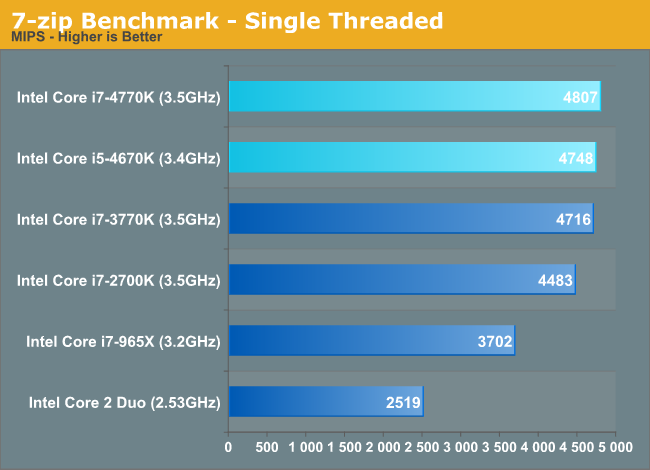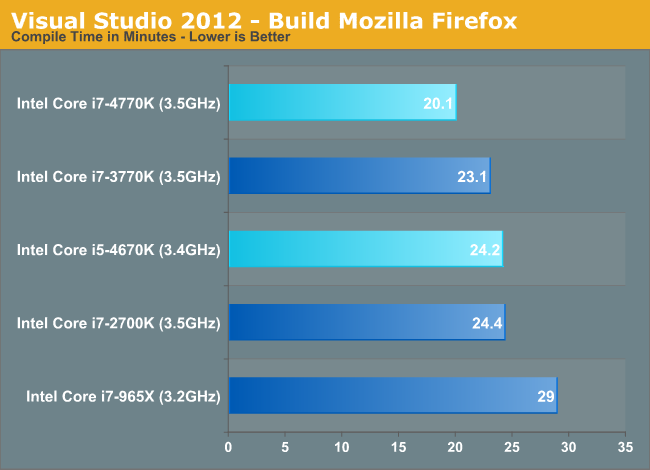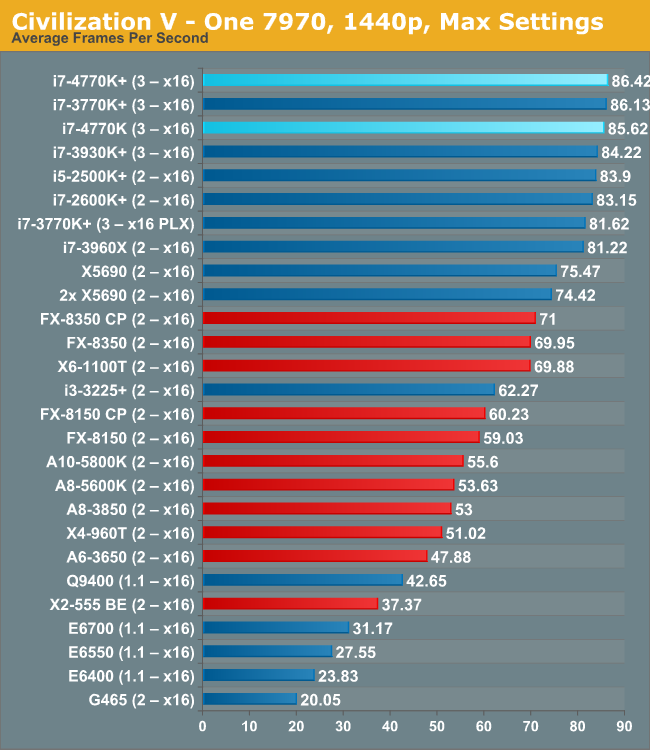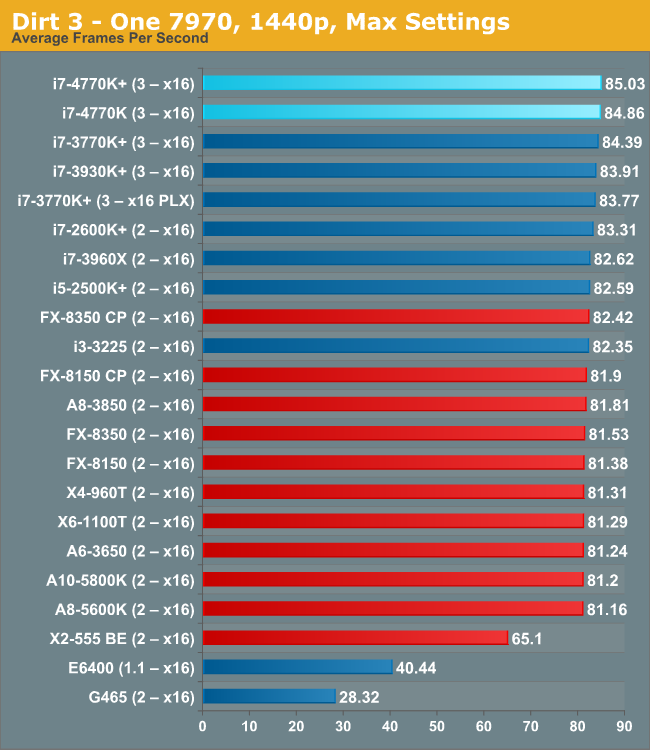The Haswell Review: Intel Core i7-4770K & i5-4670K Tested
by Anand Lal Shimpi on June 1, 2013 10:00 AM ESTCPU Performance: Five Generations of Intel CPUs Compared
For the purposes of our look at Haswell, we will be breaking up our review coverage into two parts. The rest of this article will focus on the CPU side of Haswell, while coverage of the GPU - including Iris Pro and Crystalwell - has been spun off into another artice: Intel Iris Pro 5200 Graphics Review: Core i7-4950HQ Tested.
The majority of the market doesn’t upgrade annually, so I went back a total of five generations to characterize Haswell’s CPU performance. Everything from a 2.53GHz Core 2 Duo through Nehalem, Sandy Bridge, Ivy Bridge and Haswell are represented here. With the exception of the Core 2 platform, everything else is running at or near the peak launch frequency for the chip.
In general, I saw performance gains over Ivy Bridge of 1 - 19%, with an average improvement of 8.3%. Some of the performance gains were actually quite impressive. The 7.8% increase in Kraken shows there’s still room for improvement in lightly threaded performance, while the double digit FP performance gains in POV-Ray and x264 HD really play to Haswell’s strengths.
Compared to Sandy Bridge, Haswell looks even more impressive. The Core i7-4770K outperforms the i7-2700K by 7 - 26%, with an average performance advantage of 17%. The gains over Sandy Bridge aren’t large enough to make upgrading from a Sandy Bridge i7 to a Haswell i5 worthwhile though, as you still give up a lot if you go from 8 to 4 threads on a quad-core part running heavily threaded workloads.
Compared to Nehalem the gains average almost 44%.











Quite possibly the most surprising was just how consistent (and large) the performance improvements were in our Visual Studio 2012 compile test. With a 15% increase in performance vs. Ivy Bridge at the same frequencies, what we’re looking at here is the perfect example of Haswell’s IPC increases manifesting in a real-world benchmark.
Gaming Performance
After spending far too much time on the Iris Pro test system, I didn’t have a ton of time left over to do a lot of gaming performance testing with Haswell. Luckily Ian had his gaming performance test data already in the engine, so I borrowed a couple of graphs.
As expected, Haswell is incrementally quicker in GPU bound gaming scenarios compared to Ivy Bridge - and most definitely at the top of the charts.












210 Comments
View All Comments
klmccaughey - Monday, June 3, 2013 - link
AMD are a damn sight closer on Nvidia than they are to Intel, though still sandbagging for this year. It's a bad year for us upgraders!aCuria - Saturday, June 1, 2013 - link
This review needs a compilation speed test against the 3930k, I would really like to know if haswell could edge out the 3930k in that testKevin G - Saturday, June 1, 2013 - link
Haswell met expectations in terms of IPC increases and power reductions. Both of those are good things overall. However, I feel disappointed and that comes down to how Intel has segregated their product line up: GT3e and TSX are only available on select parts. Ideally on the high end I'd like to get a socketed chip with an unlocked multiplier, GT3e, TSX, and Hyperthreading. Of those five criteria, at best I can get three of those. I suspect that this is due to Intel keeping several possible configurations reserved for their Xeon lineup but those chips won't have an unlocked multiplier.I'm currently an owner of a Sandybridge i7-2600K and the current performance of the Haswell parts aren't that tempting to jump the configurations Intel is selling. So I'm left waiting another year for a future desktop refresh before making the jump. Oh wait, Broadwell is going to be strictly a mobile refresh (and possibly a desktop BGA) refresh. So the best upgrade path for me for the next couple of years is to wait for a cheap i7-3770K on clearance. Otherwise the price/performance gains are radically higher as to not be worth it (also would need to get a new motherboard for socket 1150). I guess I'm left waiting for Skylake, get lucky that Intel adds several SKU's that I want or see what AMD can produce for the desktop.
Khato - Saturday, June 1, 2013 - link
Just curious as to your source for TSX only being available on select parts? The only place I saw that was on the Tom's Hardware preview. It's not in any of the reviews that I've seen?amock - Saturday, June 1, 2013 - link
According to http://ark.intel.com/products/75123/Intel-Core-i7-... the 4770k doesn't have TSX support.Kevin G - Saturday, June 1, 2013 - link
Intel is likely keeping TSX away from any desktop part with eDRAM. I suspect that having a massive L4 cache and TSX may make these quadcore chips very competitive with some of their socket 2011 parts based upon Sandy bridge/Ivy Bridge cores. These would happen in heavily memory bound applications like some database operations tend to be. Intel hasn't updated ARK with all of the Haswell chips yet so I'm be curious to see if their will be a mobile part with GT3e + TSX. I'd love it if some enterprise DB's supporting TSX were tested on this platform to see if this idea pans out.smilingcrow - Saturday, June 1, 2013 - link
The i5/i7 K series socketed desktop chips don't have eDRAM anyway so that's a moot point; they both lack TSX support.Kevin G - Monday, June 3, 2013 - link
Well it does look like that the L4 cache in GT3e parts can make Haswell competitive with socket 2011 six core chips. Check out the i7 4950hq results from Tech Report's Euler 3D fluid dynamics tests:http://techreport.com/review/24879/intel-core-i7-4...
The i7 4950 was likely seeing a strong benefit from an open air test bed (it is a mobile part) so I suspect that it can reach its 3.4 Ghz four core turbo relatively often. I still would expect slightly better performance if the 2.4 Ghz base clock was raised. The i7 4950 is further handicapped as the L3 cache was cut down to 6 MB and was using SO-DIMM memory with loose timings. The kicker is that this is with legacy code with any AVX2, FMA or TSX benefits.
I really, really want an unlocked, noncripppled socket 1150 part with GT3e.
just4U - Sunday, June 2, 2013 - link
Well.. your already on a i7.. and tbh I'd say the 2600K is better than the 3770K. .I purchased a 2700K even though the 3770K was out. Why? Well.. lower heat and miniscule gains in the 3X line.. plus when I decide to OC I'll likely get more out of my chip (as will you..) than they get on the IvyBridge processors.Kevin G - Monday, June 3, 2013 - link
I currently have my i7 2600K running at a conservative 4.2 Ghz. I've gotten it to boot at 4.6 Ghz with ease and probably could go further if felt like increasing voltages and got better cooling (though it is in a 4U server case so cooling options are a bit more limited).Price drops are happening for the i7 3770K. Probably need to wait a bit more and might pick one up if they drop further. Microcenter has dropped them to $230 already.